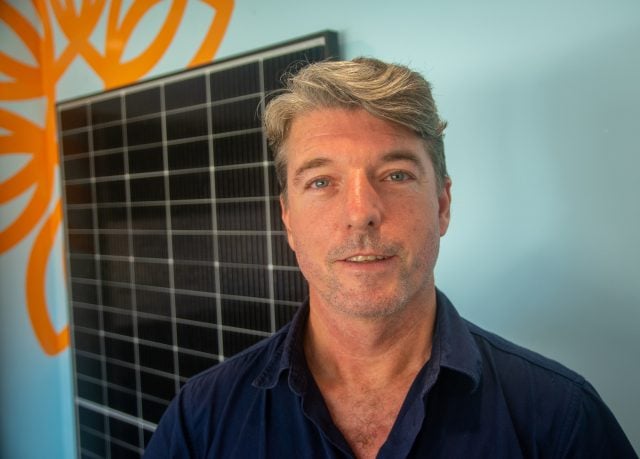
Independent Ballina Shire Councillor Jeff Johnson has lost a last-ditch effort to reinstate a council investment policy clause in favour of diverting from fossil fuels.
The council last year voted to get rid of a clause directing staff to invest council funds in non-fossil fuel aligned accounts when the expected yields shown were better, the same, or no worse than 0.05% less, compared to fossil fuel aligned accounts.
The vote came after 53 of 56 public submissions on the council’s proposed investment policy showed support for reverting back to the 0.05% preferential margin or strengthening the policy for non-fossil fuel aligned investments.
The preferential margin was expected to represent around $9,000 in potential annual foregone profits, council staff said at the time.
Staff recommended dropping the preferential margin and a council majority of 6-4 voted accordingly.
More than one way to invest in fossil fuel free projects

Ballina Shire Council’s makeup hasn’t changed since last June’s vote but that didn’t stop Cr Johnson again trying to persuade objectors to take stronger action on climate change on behalf of ratepayers.
The councillor’s arguments for the reintroduction of a 0.05% preferential margin came as an amendment to a motion that otherwise supported the council’s latest amended investment policy for public display and feedback.
Greens Cr Simon Chate had seconded Independent Cr Rodney Bruem’s motion of support, indicating satisfaction with how the policy was looking.
Early in debate, council staff said they’d resolved to increase the quota or percentage allowed to ‘B-rated’ institutions.
Staff gave the example of the Bank of Queensland, saying where before they might have kept a quota of 10%, now they could go to 20%.
‘It does give us more flexibility and ability to go to fossil fuel free,’ staff said, the Bank of Queensland notwithstanding.
Cr Jeff Johnson calls for leadership on fossil fuel investment

But once Cr Johnson raised the possibility of a return to another form of stronger support for fossil fuel-free companies, backing came from the two Greens councillors, Chate and Kiri Dicker.
Cr Johnson said he saw the preferential investment margin as helping ‘push the renewables and the transition away from fossil fuel developments’.
‘I think we should go back to that,’ Cr Johnson said, ‘I think that’s showing leadership in our community.
‘I don’t have to remind anyone that we are a very low-lying island inside a river mouth,’ Cr Johnson said.
‘It aligns with our other climate policies and initiatives that we are doing’.
Cr Johnson lost the amendment 6-3, with Independent Cr Eoin Johnston voting against, in contrast to when he voted against removing the clause in the first place last year.
Independent Cr Eva Ramsey was absent from the vote.
Staff neutral on political debate over investment risks

During debate, Cr Bruem raised concern the preferential margin would heighten the council’s ‘risk profile’ and called for clarification.
‘That’s the political debate here,’ staff replied, ‘some councils believe by doing that, you get a higher level of non-fossil fuel investments’.
‘So it’s what weighting you put on that versus a potential loss of whatever the figure may be,’ staff said, ‘so that’s not a question I can answer as such’.
The mayor interjected.
‘No, we’re talking about risk, we’re talking about the risk aspect,’ Cr Sharon Cadwallader said.
‘It doesn’t necessarily change the risk as such,’ staff answered, ‘it depends who you end up investing with’.
At no point in the debate did anyone define what they meant by ‘risk’, leaving the impression risk itself was too risky a topic to analyse.
60% of Ballina Council investments in fossil fuel aligned companies

The council investment policy’s fresh scrutiny came alongside a staff update of the council’s portfolio for its ordinary May meeting.
Figures show the council had $107.3 million in various investments as of the end of April, mostly with fossil fuel aligned banks.
The largest share at 14.9% was invested in Westpac, followed by 14% in the Commonwealth Bank and 13% in the National Australia Bank, with the three major banks representing nearly 42% of the total council investment portfolio.
A detailed staff graph showed none of the three were classified as fossil fuel free or Green.
A further 6.5% of investment funds were allocated to each of the Bank of Queensland and ME Bank and 4.8% to AMP Bank, with none of those three classified as fossil fuel free or Green either.
A total of around 37.5% of the portfolio was classified as fossil fuel free or Green, including funds with Suncorp, BankVic, Auswide Bank, Bendigo and Adelaide Bank, Defence Bank and Police Bank.
The figure was an increase of around 3 percentage points compared to March figures, with staff saying they’d made $8 million worth of new investments in April, including $5 million in ‘non-fossil fuel aligned institutions’.
Bruem highlights low aspirations in Ballina

‘Our numbers are pretty similar to Lismore at the moment,’ Cr Bruem said when supporting the amended investment policy for public display, ‘and about double what Byron Shire is doing, which is interesting’.
‘I think there are many people in the shire who have a very hard-headed and sensible approach to this topic,’ Cr Bruem said, ‘and they still view fossil fuels as legal and a legal business in the country’.
‘They don’t necessarily see it as something to be avoided all at all costs,’ he said.
‘Once again, there’s diverse views in our shire on this.’
Ballina bottom line benefits from cash rate increases
The council’s investment updates came included an update on maturing investments.
Staff said of $12 million worth of maturing investments, non-fossil fuel aligned institutions accounted for $3 million, or 25%.
Overall, staff noted the council’s actual interest earned was trending well above the staff budget, owing to ‘continued increases in the cash rate’.
Staff said an increase in the interest budget would be seen in the May report after the council had adopted its March 2023 quarterly budget review.
